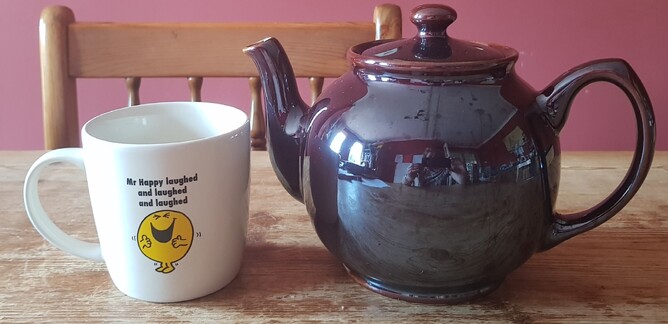How was your morning cuppa today?
If I were to propose that starting to call this mug “happy” can help you feel more positive, does that sound quite or maybe even extremely unlikely?
Daily Affirmations - Do they work?
Daily affirmations or repeating positive statements about ourselves has long been part of the self-help world. Some people find them motivating, others irritating.
There’s a whole industry in coming up with new catchy phrases that can be put onto t-shirts, in picture frames and yes, printed on mugs.
But does it do us any good, saying these affirmations? The answer like with most things is – it depends. And the 'depends' in this case may well have a lot to do with the language used.
Affirmations need to be realistic
Firstly, it’s important affirmations are realistic. Saying “I am always happy!“ over and over is likely to be ambushed by your inner critic. “Yeah right, always? You’re just being ridiculous!”
But we can be cunning and use the imprecise nature of the English language to wrap our positive package in a completely plain wrapping. That way it can be delivered before the inner critic is even aware it exists and certainly before it demands it be opened for inspection.
Here's the key
The key is to attach the positive word ‘happy’ to something else, not you. If this is sounding a bit far fetched then bear with me.
So let’s say we wake up in the morning and go through our ritual of making our first cuppa. Rather than repeating over and over “I am happy” we can instead notice the things around us and comment positively on them. So we might say to ourselves “Ah, good morning, there’s the happy curtains and the happy sofa and as we take our favourite mug out the cupboard we might comment “look there’s the happy mug".
Now the mind isn’t as daft as this post is beginning to sound. The mind knows these inanimate objects can’t be happy, but the mind does like answers. And so it starts searching for a match of what “happy” means and in doing so it finds what it does know about the state of being happy – and bingo, it finds the internal state that is “happiness”.
So provided you have experience of a happy state, even though you may not have connected with that state for a while, your mind can find it and connect with it.
It pays to practice
Of course well worn paths are easier to follow than overgrown ones. So get in the habit of noticing your happy mug, your happy curtains and your happy sofa each time to get up in the morning to make your first cup of tea. And continue to notice all the other happy items around you as you let that tea brew and then sit down and take your time to drink it. Then over time it can become easier and easier for your mind to make its search. In fact 10 minutes a day practice may be all that’s needed, just for a few weeks.
And before long it’s happening automatically, just as soon as you notice these familiar things each and every day. And that can make a real difference to the start of your day.
Will you feel a bit silly doing this?
Now, to begin with, you may feel a bit silly saying good morning to inanimate objects.
But then again what else are you going to doing whilst you wait for the kettle to boil? You could allow that inner critic to fill the space and tell you in no uncertain terms what it thinks about how your day is going to pan out?
Or you could intervene and guide your mind in a different, more positive direction.

